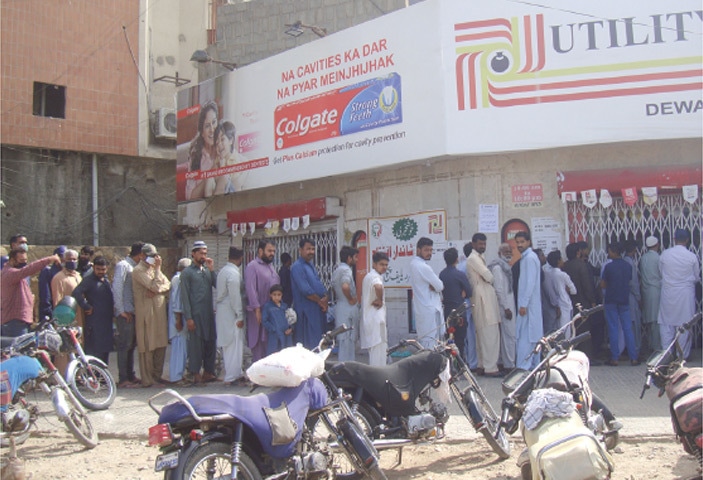
KARACHI: The queues outside the Utility Stores are growing longer across the city. Panicked and angry buyers are standing for hours in the line, barely a few inches apart from each other to get flour, lentils, sugar, tea and ghee or oil. Many Utility Stores in the city are allowing five people inside at a time.
“Our sales normally are Rs225 million per day nationwide” says Umar Lodhi, Managing Director of the Utility Stores Corporation. “These days this has shot up beyond Rs300m.”
He attributes this spike only partially to panic buying, saying it is equally due to the subsidies the store offers. “In Islamabad the sales have actually gone down in the past few days because large numbers of people have left town for the long weekend. In Lahore I see a mostly normal situation. Yes, in Karachi there is some rapid off take of key items.”
He lists those items as flour, lentils, sugar and tea primarily.
“In times like these people will focus on essential items.”
Long queues seen outside shops as coronavirus uncertainty mounts
Talking to Dawn, customers outside a Utility Store in Karachi said shops in their respective areas are selling flour and ghee at higher rates.
“We cannot buy these items in bulk and store them because we don’t have money,” they said.
To avoid congestion, many stores have started to use just one door for entry and exit rather than two separate doors. This means that the wait time is longer for those who are standing outside in heat. Policemen wearing surgical masks are guarding the premises to avoid any untoward incidents.
As the buyers huddle for shade outside the stores, out goes ‘social distancing’ — which requires at least three feet of distance between individuals. As consumers pack into the stores the risk of these outlets turning into transmission nodes for the infection also increases.
There is a need to have the items — flour, oil, ghee, sugar, rice and tea — placed outside the premises by setting up temporary stalls so customers can buy and leave as soon as possible.
Better still would be to place pre-packaged bags with selected items so that minimal contact and contamination is there.
Published in Dawn, March 22nd, 2020














































